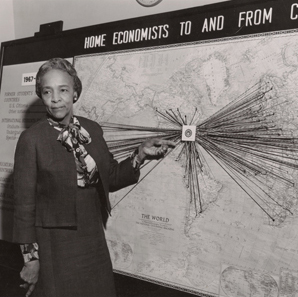Scholar recounts life of black, female academic pioneer
By Scott Goldberg

Flemmie Kittrell’s life embodies a story of activism, education and accomplishment. The first African-American woman in the country to earn a Ph.D. in nutrition, Kittrell paved the way for minorities to pursue their education at the university level.
In a March 20 talk, “To Encircle the World: Flemmie Kittrell and the International Politics of Home Economics,” in Mann Library, Allison Horrocks, a doctoral student at the University of Connecticut and the recipient of the 2013 Dean’s Fellowship in the history of home economics in the College of Human Ecology, delivered an account of Kittrell’s life.
“As much as this is a story about place and race, it’s also about age,” said Horrocks, who traced Kittrell’s rise to prominence as an international nutrition expert and connected her to a diverse group of activists and academics in the field. “Lives like Kittrell’s defy easy categorizations, and they show us the value of thinking longitudinally across a few different historical periods,” Horrocks said.

Kittrell completed her Ph.D. at Cornell in 1936 and became the dean of women and head of the of home economics department at Hampton Institute. She left Hampton in 1944 to become head of the home economics department at Howard University in Washington, D.C., where she developed a broader curriculum for home economics that included child development and nutrition, and co-founded Howard’s School of Human Ecology.
In emphasizing the significance of women’s education, Horrocks said, “Kittrell’s story gives us a rare opportunity to think about the ways in which women of diverse backgrounds gained various levels of access to state and to international institutions.”
In 1947, Kittrell carried out a nutritional survey of Liberia. Her findings concerning “hidden hunger,” a type of malnutrition which occurred in 90 percent of the African nation’s population, led to important changes in Liberian agriculture and fishing, Horrock’s said.
Horrock aimed to dispel misunderstandings of Kittrell’s role in history. “Many histories of home economics assume that the field was only composed of white women. … These alternate histories of internationalism and diversity have become unthinkable,” she said.
During more than 40 years as an educator, Kittrell traveled abroad extensively, hoping to improve home life in developing nations. “Too many histories assume that these women were domestically oriented in that the women were supposed to stay home, and that they never left the country,” Horrocks said. “My goal today isn’t just to challenge that assumption, but to argue that these women’s stories really have a lot to offer in terms of teaching us something about academic politics, the constraints on women’s work and visions of the United States’ place in the world.”
Scott Goldberg ’16 is a writer intern for the Cornell Chronicle.
Media Contact
Get Cornell news delivered right to your inbox.
Subscribe